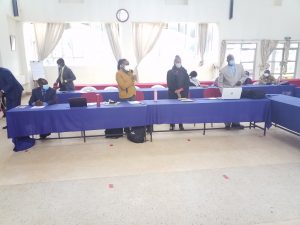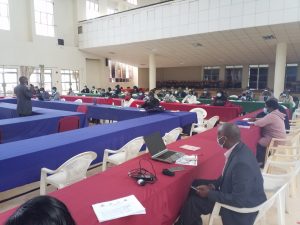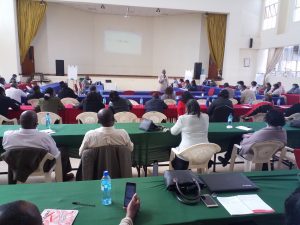CBC TRAINING AT KAGUMO TEACHERS' TRAINING COLLEGE
The lecturers were taken through the Legal Frameworks and Policies in Education and also the Curriculum Frameworks that give the base for CBC after which curriculum implementation, with a focus on designs and components, was covered in great detail on the first day. The second day saw focus shift to Pedagogy and ICT integration, beginning with a topic on Professional learning base. This is well summarised in the CBC Teacher Education programme where 6 key factors are outlined. These are Content, Pedagogical content knowledge, curriculum theory, assessment and evaluation, Counselling and epistemology and finally Communication and Language. The discussion here revolved around what a teacher needs to focus on in order to be effective. Issues such as mastery of content, skill to deliver the content using appropriate methods or techniques, the resources to support the activities the teacher has selected to facilitate learning with, skill to create an enabling environment to enhance learning, knowledge of learners and their characteristics, issues of etiquette and professionalism, mentorship and coaching as well as methods of assessment were well explained.
The lecturers were then taken through the CBC learning approaches. Attention was given to those approaches unique to CBC and which have hardly been in use during instruction in the 8-4-4 system. These approaches are such as Blended learning, Differentiated learning and Collaborative learning. The approaches lay more emphasis on the learner and his or her skills. With the CBC learning styles being categorized into three; auditory skills, Kinesthetic skills and visual skills. Depending on how the three skills interact we can get learners who are “musical”, “Spatial” and those who are inclined towards reading and writing.
Then there was a brief but very interesting session on Resources, those that will help the learner bring out their creativity, skills and talents and during the manipulation of which the core competencies such as communication and collaboration, and values such as love and also respect for others can be integrated.
There was then a session on ICT integration and the take home here was the difference between having a “teacher’s presentation” and actual “ integration of ICT” the latter getting the learner him/herself to interact with the ICT gadgets. It was exciting to learn new ways in which teachers can use the computer to get immediate feed- back in a fun way such as the Mentimeter App. Lecturers were introduced to how ICT can be used to organize content based games via Applications like ‘Kahoot’, bringing an interesting twist to any lesson. ICT skills will be mandatory for the CBC teacher as it is one of the core competencies (Digital literacy) and teachers will be expected to integrate the same during instruction.
Day three and some of day four was on assessment with a detailed explanation on how to assess learners in CBC being presented. It was a day when facilitators made time for practical work and presentations during which the ‘Authentic Task’ was well explained and illustrated. The methods that are akin to CBC assessment also received due attention. These are such as: Rubrics, Anecdotal records, Journals and portfolios to mention but a few.
There was a very informative session on the inclusive Education Programme (IEP), Pertinent and Contemporary Issues (PCIs), Parental Empowerment and Engagement (PEE), Community Service Learning (CSL) and Value Based Education (VbE) all of which are key to producing a learner who is aware of him/herself and their potential and a support system that will help to nurture that potential.
Last day, day five of the training, was on Professional Documents – the Scheme of Work, Lesson Plan and Record of Work and the changes therein after which the training came to an end with a discussion on Micro teaching and Practicum; their importance and the changes to be expected with CBC.
The closing ceremony was graced by the TSC regional Director Ms Juliet Kariuki accompanied by Deputy Regional Director of Education Ms A.B.Kegode. This session kicked off with Dr. R Karanja giving a RECAP of the week and conveying gratitude to the facilitators- Dr Catherine Warui, Dr Catherine Kanana, Ms Winnie Kinuthia and Mr. Moses Okembu , on behalf of the entire teaching fraternity. He thanked them for the immense knowledge they had imparted to the members and for the apt mode of delivery they had used. The Chief Principal joined him in appreciating the facilitators and also TSC for funding the training. He acknowledged the Ministry of Education as well, for the role it had played during the training. The Deputy Regional Director of Education on her part reiterated the importance of CBC in appreciating each and every learner, even those who have been condemned for many years as incapable of learning. In her closing remarks, the Chief Guest -The TSC Regional Director, encouraged the lecturers to use the knowledge gained during the week to train teachers better and thereby produce better teachers which will eventually have a positive impact on the learner in the class in the future.
We thank all those who made the training possible as it was no doubt, a week well spent.
Susan Wanjohi
SM Languages and CS.


?




I am text block. Click edit button to change this text. Lorem ipsum dolor sit amet, consectetur adipiscing elit. Ut elit tellus, luctus nec ullamcorper mattis, pulvinar dapibus leo.